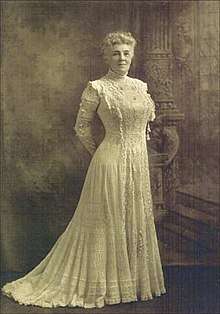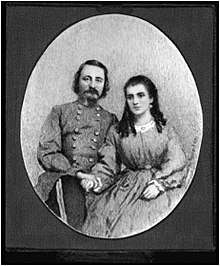LaSalle Corbell Pickett
_Corbell_Pickett.jpg)
LaSalle "Sallie" Corbell Pickett (May 16, 1843 - March 22, 1931) was an American author.
Early life
LaSalle "Sallie" Corbell was born in Chuckatuck, Virginia, on May 16, 1843, the daughter of David John Corbell and Elizabeth Phillips, slaveholders and plantation owners near Suffolk. [1] [2]
She attended the Lynchburg Female Seminary in Lynchburg, Virginia. [2]
Career

Pickett obtained a professorship in belles-lettres and taught French, Latin and piano in Sherbrooke, Canada. She also sold her jewelry to maintain the family. After General Ulysses S. Grant insisted that the cartel which granted privileges to her husband should be honored, General Pickett and his family returned to their home in Virginia. General Grant then tendered General Pickett the position of Marshal of Virginia, but he chose to accept a work position with the New York Life Insurance Company in Norfolk, with a large salary. [1] [2]
Her husband died of scarlet fever in 1875. The sympathy of the South was aroused, and a subscription was started with eight-thousand dollars from one State, and pledges of thousands more from the devoted comrades of her dead hero. Hearing of that plan to put her above the anxiety of temporal want, Pickett resolutely declined to accept financial aid, and soon secured a position as a government clerk in the Federal Pensions Office sufficient to support herself and son. In the 1880s, she became a popular writer and speaker. Her first book was published in 1899, "Pickett and His Men". Between 1899 and 1931 she toured America and wrote for Cosmopolitan, McClure's and other popular magazines; and published more than a half dozen books. [1] [2]
In 1891, after recovering from a distressing accident, she was threatened with total blindness. As with one heart, the South gave her assurances of sympathy and support, and messages flashed over the wires that she had only to command Pickett's old comrades, and they would rally to her aid. To her belongs the honor of uniting the Blue and the Gray in fraternal bonds. She has been the messenger of peace, trying to reconcile the two factions and ridge over the chasm once so broad and deep. No woman at the time was more widely known and honored than Pickett. With health broken and the almost total loss of her sight, she retained her position in the clerical service of the government, in Washington, and honestly earned her own living, when she could have been heir to the liberality of the South. [1]
Personal life

Sallie Corbell married Gen. George Pickett on September 15, 1863, a short time after his famous charge at Gettysburg and the three-day conflict which linked his name to the line of heroes crowned with national homage. Her trousseau was smuggled across the lines in bales of hay, and the girlish bride-to-be, taking her fate in her own hands, donned the garb of an old country woman, who sold vegetables to the soldiers, and through strategy reached the camp of General Pickett, who was eagerly waiting for his young bride. They had two sons: George Edward Pickett (1864-1911), who died at sea returning from the Philippines on an Army transport ship in April 1911, and David Corbell Pickett (1866-1874), who died in childhood. From the day of her marriage she shared every phase of army life in camp and in battle, by the side of the hero whom she worshiped. When the war was over, an effort was made to take from General Pickett the privileges given him by the Grant-Lee cartel, and the General and his wife went to Canada, and lived at the St. Laurent Hotel in Montreal. [1] [2]
She died on March 22, 1931, and was originally buried at Abbey Mausoleum, Arlington National Cemetery, due to the fact that women weren't allowed to be buried in the Confederate section of Hollywood Cemetery in Richmond, Virginia. In 1998 she was re-interred in front of her husband.
Works
- Pickett and His Men (1899)
- Kunnoo Sperits and Others (1900)
- Yule Log (1900)
- Ebil Eye (1901)
- Jinny (1901)
- Digging Through to Manila (1905)
- Literary Hearthstones of Dixie (1912)
- The Bugles of Gettysburg (1913)
- The Heart of a Soldier, As Revealed in the Intimate Letters of Gen'l George E. Pickett, C.S.A. (1913)
- Across My Path: Memories of People I Have Known (1916)
- What Happened to Me … (1917)
- Soldier of the South: General Pickett's War Letters to His Wife (edited by Arthur Crew Inman, 1928)[2]
References
- 1 2 3 4 5 Willard, Frances Elizabeth, 1839-1898; Livermore, Mary Ashton Rice, 1820-1905 (1893). A woman of the century; fourteen hundred-seventy biographical sketches accompanied by portraits of leading American women in all walks of life. Buffalo, N.Y., Moulton. p. 570-571. Retrieved 8 August 2017.

- 1 2 3 4 5 6 "LaSalle Corbell Pickett (1843–1931)". Retrieved 1 September 2017.